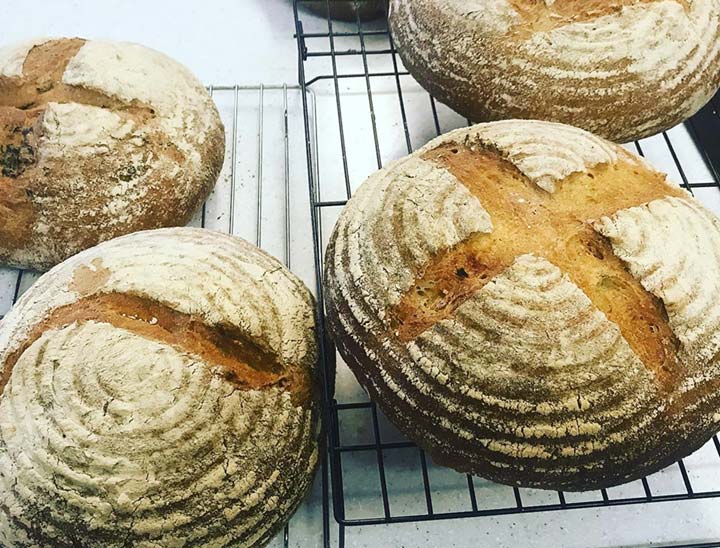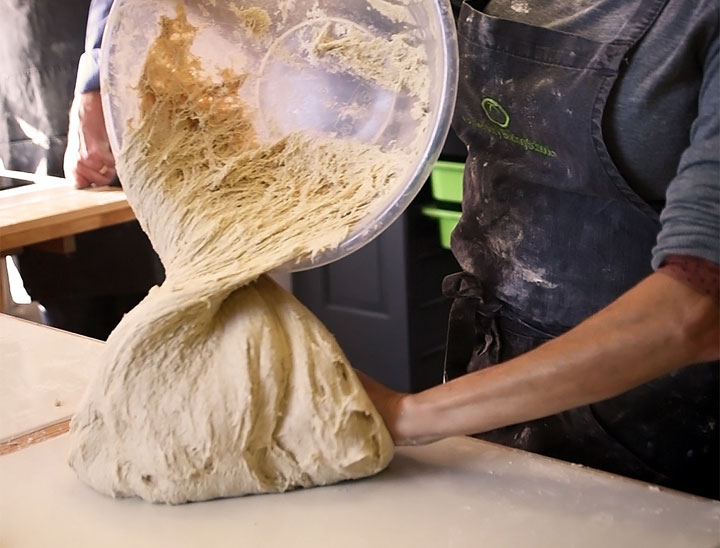Why Sourdough: Is Sourdough Good For You?
Posted on November 15th, 2019

We are passionate about sourdough here at Canterbury Baking School. But why should you bother with this slow bread making process? Yes, it’s delicious, but is it really worth the effort? Is sourdough really healthier? In this blog post, we’re going to look beyond the hype and see why this traditional bread making process will benefit your health.
What Makes Sourdough Bread Different?
Sourdough is an ancient bread making method which typically uses nothing but flour and water. These two ingredients are allowed to ferment using wild yeasts and lactic acid bacteria that exist naturally in the air. This forms a ‘starter’ which needs to be fed with more flour and water daily, until it is active enough to create a loaf of bread. After a few days, the starter will be ready to use for baking. Baking a sourdough loaf is also a slow process. Compared to everyday bread made with yeast, it needs much longer to rise, anywhere from 12 – 24 hours or even longer, before it is ready to bake.
So what actually happens during this waiting period? During fermentation, the microorganisms in the starter ‘feed’ on the flour. They produce enzymes that break down substances found in flour such as phytates, fructans, and of course gluten. These microorganisms also produce lactic acid, which is what gives the sourdough its distinctive ‘sour’ flavour. So why this is important? Let’s take a look…
Nutritional Benefits
Phytates are a substance found naturally in wheat flour and many other foods. They affect your digestion and interfere with the absorption of certain nutrients. When you eat foods containing phytates, the phytate molecules can bind with nutrients in your food so your body can no longer use them. So eating sourdough, where the phytates have been broken down during fermentation, actually means that you will absorb more nutrients from your meal, compared to eating normal wheat bread. The longer the ferment, the more nutritious the bread.
Basically, when you eat quick breads made with yeast, much of the goodness in the flour passes right through your digestive system. It will, quite literally, just go down the pan!
Gut Health
You can’t have failed to notice the buzz around probiotics and gut bacteria nowadays – but what’s that got to do with sourdough? Well, these microorganisms that create the delicious sour taste and make it rise include billions of beneficial bacteria! These bacteria are the good guys you need in your gut to help your digestion, boost your immune system, and many other benefits associated with probiotics. These probiotic bacteria need many hours of fermentation, and you just don’t get them in quick breads, whether homemade or shop bought.
Another added benefit is that sourdough is much easier to digest, because the microorganisms have actually pre-digested the flour for you! Remember how we talked about fermentation? This is basically what happens in your gut when you eat wheat. This is why some people get unpleasant symptoms like bloating and gas after eating bread. With sourdough, this process starts to happen even before a crumb even passes your lips! This means that some people who struggle to digest normal bread can happily munch on sourdough without any issues. Many people with IBS, gluten intolerance or sensitivity to FODMAPs, who normally struggle with bread, can tolerate sourdough happily.
Note: Sourdough bread is not suitable for people with coeliac disease, unless it is certified gluten-free.
Blood Sugar
Grains, including wheat, are carbohydrates. When you eat it, the carbs are turned to sugar and enter your bloodstream. If you eat a slice of typical sliced white bread, you’ll soon get a rush of sugar entering your blood stream. You may get a boost of energy from it, but it will be short lived, and your energy will soon slump down again. This is because your body releases insulin to regulate your blood sugar level and stop it getting too high. So when you eat bread, you’ll get a sharp spike in your blood sugar, and then your pancreas will produce insulin to bring it down again. This is why you may feel tired and hungry a couple of hours after eating bread.
Compare this to sourdough. Sourdough bread contains higher levels of resistant starch than quick breads. Resistant starch is a more complex molecule – it literally resists being digested! This means it takes longer for your body to break it down, keeping your blood sugar more stable over a longer period of time.
Sourdough: Where To Start
So, sourdough is undoubtedly a healthier option when you are choosing breads. If you’d like to try sourdough, you could start with shop-bought loaves. But beware! Although they still do taste delicious, many are just quick breads with a sour flavour added. Check labels carefully. If it contains ingredients other than wheat and flour, it may not be a genuine sourdough loaf.
Many people prefer to make their own sourdough, as you know exactly what has gone into it. You can also control the length of the ferment. Making sourdough isn’t difficult, but it is very different to making normal breads. That’s why here at Canterbury Baking School, we encourage you to learn face-to-face from an experienced baker. Once you get into a routine, it’s very easy, and Vicky will share everything she has learned over many years of baking sourdough for her family. Come along to one of our baking classes to learn more.


